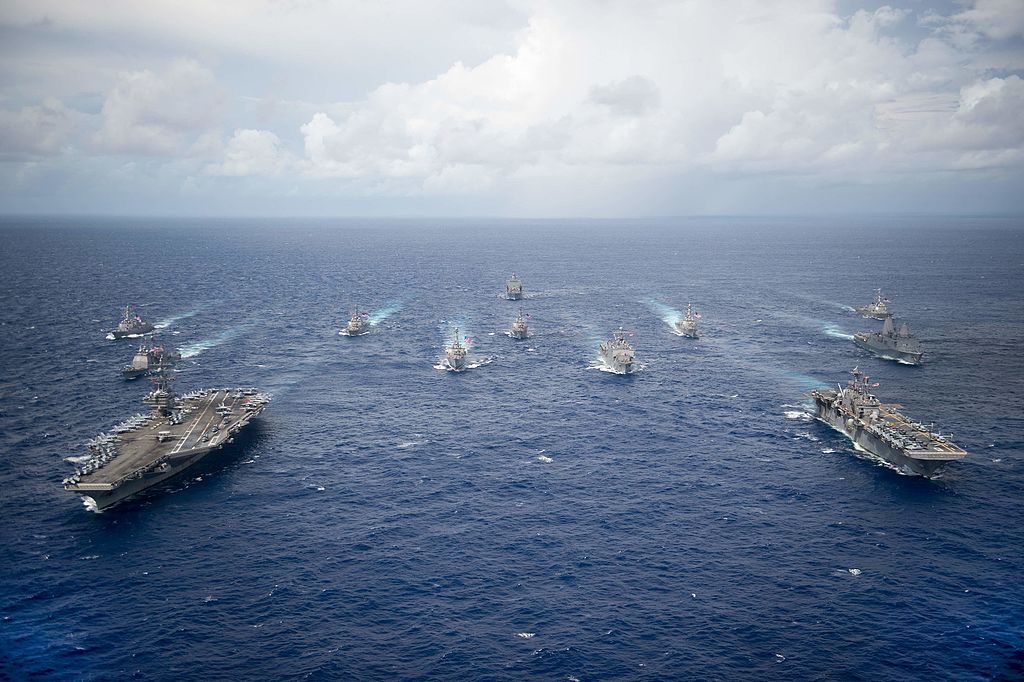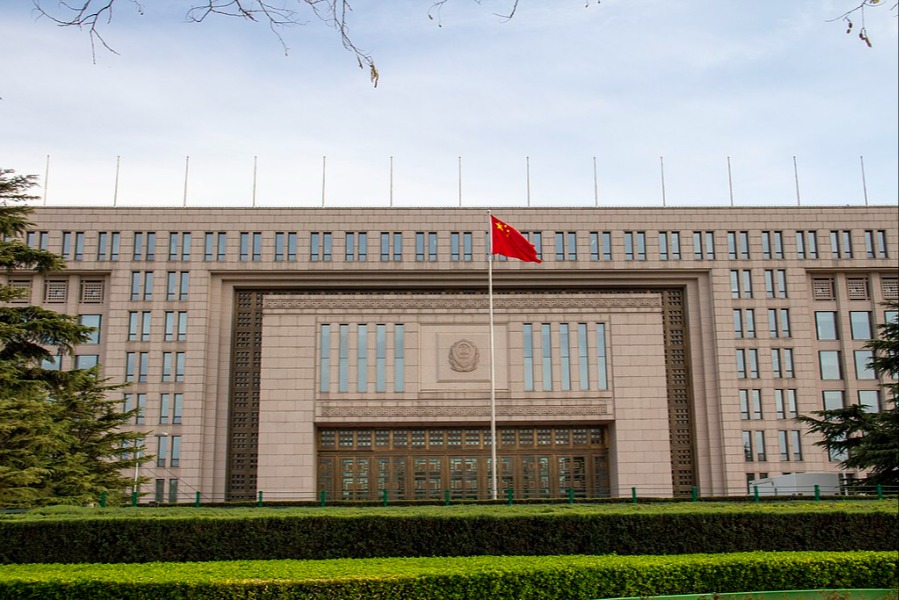It’s Time for South China Sea Economic Sanctions
The most recent U.S. freedom-of-navigation operation (FONOP) in the South China Sea garnered the usual global headlines, but it also shows how ineffective such operations have been in deterring Chinese actions in the region. It was so inconsequential that the Chinese Ministry of Foreign Affairs could not even be bothered to come up with new phrases in what is now a ritualized denunciation.

Published by The Lawfare Institute
in Cooperation With

The most recent U.S. freedom-of-navigation operation (FONOP) in the South China Sea garnered the usual global headlines, but it also shows how ineffective such operations have been in deterring Chinese actions in the region. It was so inconsequential that the Chinese Ministry of Foreign Affairs could not even be bothered to come up with new phrases in what is now a ritualized denunciation. Its May 27 statement is nearly word-for-word identical to a 2017 Foreign Ministry statement denouncing a similar FONOP.
U.S. policymakers need to face facts: The current U.S. policy of conducting FONOPS and loudly emphasizing U.S. commitment to a “rules-based international order,” which was recently reiterated by Defense Secretary James Mattis, is not succeeding in deterring Chinese expansionism, much less roll back existing Chinese gains, in the South China Sea. As I and other observers have noted for years, FONOPs alone were never going to be real deterrence strategy, and the recent Chinese deployment of cruise missiles, nuclear-capable bombers, and other military assets in the South China Sea have confirmed this assessment. It is well past time for the U.S. to expand its policy toolkit by imposing economic sanctions targeting China’s building activities in the South China Sea.
Why are FONOPs not effective at deterring Chinese expansionism? The short answer is that FONOPs serve to assert legal rights that do not necessarily contradict the most controversial aspects of China’s own legal claims in the South China Sea. While China always complains about U.S. FONOPs, China could actually accept U.S. legal positions on freedom of navigation while continuing with almost all of its controversial activities in the South China Sea.
The disagreements between the U.S. and China highlighted by FONOPs are often technical and largely inconsequential to what really divides the U.S. and China in the region. For instance, the U.S. objects to Chinese requirements that military vessels seek permission before conducting an innocent passage within a country’s territorial waters. But if the Chinese adopted the U.S. legal position, it could still maintain its sovereign claims to control those territorial waters and a right to demand foreign warships follow rules of innocent passage.
Even when the U.S. deliberately avoids using innocent passage because it does not recognize China’s right to assert a claim to particular territorial waters, as was the case when the U.S. conducted a FONOP near China’s artificial island on Mischief Reef, the FONOP has limited impact. It simply demonstrates the U.S. has a right to sail within 12 nautical miles without following innocent-passage rules. The FONOP does not, by itself, challenge China’s right to build the artificial island there or to station military assets there.
Moreover, as the U.S. government unfailingly states whenever asked about FONOPs, such operations are part of a longstanding U.S. Navy program to assert maritime legal rights in every part of the world, and the operations are not directed at any particular country. Indeed, because several countries often claim the same land features and waters claimed by China and also share China’s legal position on innocent passage, U.S. FONOPs in the region are sometimes challenging those other countries as well as China. Despite media reports suggesting otherwise, FONOPs are not just about China.
But China is (or at least ought to be) the overriding U.S. concern in the South China Sea. In particular, the U.S. is concerned that China will achieve political and military domination of the region through its construction of large-scale artificial islands and its deployment of military assets on those islands. FONOPs have not, and will not, prevent China from achieving these goals.
The question now is whether the U.S. has other policy tools that might be more effective. There is at least one such tool that can and should be used now: targeted economic sanctions.
As I noted as far back as 2016, the president already has the legal authority to impose targeted economic sanctions on any companies, persons, or entities that have participated, or continued to participate, in the development of those Chinese artificial islands. U.S. sanctions could be limited to those companies involved with facilities on islands that are inconsistent with international law as defined by the 2016 U.N. arbitral tribunal ruling. This would include construction on land features, such as Mischief Reef, which are not entitled to a territorial sea under international law. But U.S. sanctions could actually sweep farther and be imposed on any entity, Chinese or not, that acts in ways the U.S. believes endangers its national security interests.
Such targeted sanctions, which could be modeled on those the U.S. has imposed on entities doing business with Crimea, would at least create a disincentive for non-Chinese companies that might be tempted to try to profit from China’s expansionist South China Sea policy. It would also impose costs on those Chinese companies that have been deeply involved in that construction and development of China’s islands there. For instance, China Communications Construction Company (CCCC) was intimately involved in building China’s artificial islands. CCCC has global ambitions and was recently thwarted in its bid to purchase a large Canadian construction company due to national-security concerns. But under current U.S. law, CCCC and other Chinese companies like it will pay no cost for actively profiting from what the U.S. considers dangerous and illegal activities in the South China Sea.
Even though such sanctions will not actually roll back Chinese activities (just as sanctions have not rolled back Russian control of Crimea), it at least sets out a tangible marker of U.S. government opposition to these activities. It will show the U.S. is willing to penalize China’s behavior, and perhaps more importantly, that the U.S. is willing to suffer the costs of inevitable Chinese blowback and retaliation. The U.S. government’s willingness to endure Chinese retaliation might embolden other countries to risk Chinese anger and displeasure as well by criticizing Chinese policies in the region. (As a bonus for the White House, there appears to be bipartisan congressional support for sanctions as well.)
Moreover, the U.S. and China are already on the precipice of an all-out trade war. Whatever one thinks of the merits of this trade war, It is odd that the U.S. is willing to invoke “national security” as a justification for punishing Chinese theft of intellectual property, but it is not willing to use the same rationale to defend its interests in the South China Sea. Put another way, if we must have a trade war with China, we might as well defend U.S. national security while we are at it.
FONOPs are a valuable way for the U.S. to leverage its naval advantages to defend its rights under international law and they should continue to be used in the South China Sea and elsewhere. But as a tool to push back against China in the South China Sea, FONOPs have reached the limit of whatever usefulness they may have had. The U.S. needs to do more if it wants to remain a credible ally and partner for southeast Asian nations seeking an alternative to Chinese domination. Targeted economic sanctions are not a cure-all by any means to U.S. policy woes in the South China Sea. Other options, such as direct military aid to other South China Sea claimants, should be considered as well. But targeted sanctions is clearly the place to start if the U.S. wants to move beyond FONOPs.





